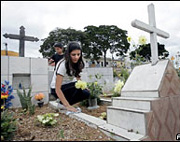|
 |
| The bill states that
"offenders will be held responsible for their
acts" |
Municipal regulations normally ban anything from
smoking in public places to parking in certain zones. But officials in the
Brazilian town of Biritiba Mirim, 70km (45 miles) east of Sao Paulo, have
gone far beyond that.
They plan to prohibit residents from dying early because the local
cemetery has reached full capacity.
There's no more room to bury the dead, they can't be cremated and laws
forbid a new cemetery. So the mayor has proposed an intriguing solution:
outlaw death.
Mayor Roberto Pereira says the bill is meant as a protest against
federal regulations that bar new or expanded cemeteries in preservation
areas.
"They have not taken local demands into consideration", he claims.
Mr Pereira wants to build a new cemetery, but the project has been
stalled because 98% of Biritiba Mirim is considered a preservation area.
A 2003 decree by Brazil's National Environment Council forbids burial
grounds in protected areas.
Biritiba Mirim, a town of 28,000 inhabitants, not only wants to
prohibit residents from passing away.
The bill also calls on people to take care of their health in order to
avoid death.
"I haven't got a job, nor am I healthy. And now they say I can't die.
That's ridiculous," Amarildo do Prado, an unemployed resident said.
The city council is expected to vote on the regulation next week.
"Of course the bill is laughable, unconstitutional, and will never be
approved," said Gilson Soares de Campos, an aide to the mayor.
"But can you think of a better marketing strategy to persuade the
government to modify the environmental legislation that is barring us from
building a new cemetery?"
The bill states that "offenders will be held responsible for their
acts". However, it does not say what the punishment will be.
(Agencies) |
åK―ïŋ―åK―ïŋ―åK―ïŋ―åK―ä°l(fĻĄ)åK―ïŋ―åK―ïŋ―åK―ïŋ―åK―ïŋ―"åK―ïŋ―åK―ïŋ―åK―ïŋ―"åK―ïŋ―ÄģÐĐåK―ØÓŋ―"åK―ïŋ―ÖđåK―ïŋ―åK―ïŋ―åK―ïŋ―"åK―ïŋ―åK―Įšïŋ―åK―ïŋ―åK―ïŋ―åK―ïŋ―åK―ïŋ―åK―ïŋ―ÎŧåKđ(jiĻĶ)Íŋ―åK―ïŋ―ĘĨåK―ïŋ―åK―ïŋ―åK―ïŋ―åK―ÔÓŋ―70åK―ïŋ―åK―ïŋ―Ö\åK―ïŋ―åK―Ų°ÍĄïŋ―åK―ïŋ―åK―ïŋ―Ä·ÐĄåK―ïŋ―åK―ÔąČ?åK―ïŋ―åK―ïŋ―åK―ïŋ―åK―ïŋ―"åK―ïŋ―åK―ïŋ―åK―ïŋ―åK―ÆŧIŋ―ŌŧåK―ïŋ―Į°åK―ïŋ―ÎīåKÄ_ĩïŋ―åKãqøPŋ―åK―îĄĢ
åK―ïŋ―åK―îĒåK―ïŋ―ÖđÐĄåK―ïŋ―åK―ïŋ―åK?ÓĒåK―ïŋ―åK―ïŋ―åK―ïŋ―"åK―ïŋ―åK―ïŋ―éåK―ïŋ―åKÝ^ĩïŋ―ÄđåK―ïŋ―åK―Ņūïŋ―"åK―ïŋ―åK―ïŋ―éåK―ïŋ―"åK―ïŋ―
ÄđåK―ïŋ―åK―Ņūïŋ―åK―ïŋ―åKģCĩÄēîēŧåKĢŽåK―ÖÔŋ―åK―ïŋ―åKģCŧïŋ―åK―ïŋ―åK―ïŋ―åK―ïŋ―åK―ïŋ―ŲžåK―ïŋ―ōåK―ïŋ―É―åK―Öđïŋ―Þ―åK―ïŋ―åKeđïŋ―ØĢåK―ïŋ―åK―ïŋ―åK―ïŋ―åK―ïŋ―åK―ïŋ―åK―ïŋ―ŌŧåK―ïŋ―åK―ïŋ―åK―ïŋ―åK?åK―ïŋ―åK―ÖŪïŋ―åK?--åK―äēžåK―ïŋ―åK―ïŋ―åK―îĄĢ
åK―ïŋ―åK―ÞÔŋ―åK―ØĄïŋ―åK―ïŋ―åK―ïŋ―åK―ïŋ―ÕfåK―ïŋ―åK―ÆŧIŋ―åK―ïŋ―åK―î·ĻåK―ïŋ―åK―ïŋ―éåK―Ëŋïŋ―åK―ïŋ―åK―ïŋ―åK―ïŋ―åK―ïŋ―åK―ïŋ―åK―ïŋ―ÖđåKđ(jiĻĶ)ąïŋ―åK―ïŋ―åK―ïŋ―åK―ïŋ―åK―ïŋ―åK―Þŧïŋ―åK―ïŋ―åK―ïŋ―ÄđåK―ØĩÄøPŋ―åK―îĄĢ
åK―ïŋ―ÕfåK―ïŋ―"åK―ïŋ―åK―ïŋ―åK―ïŋ―åK―ïŋ―?jĻĐng)]åK―Ðŋïŋ―åK―Įĩïŋ―åK―ØøPŋ―åK―ïŋ―åK―ïŋ―åK―ïŋ―ŌŠåK―ïŋ―"
åK―ïŋ―åK―ïŋ―åK―ïŋ―åK―ïŋ―åK―ïŋ―åKãq―ïŋ―ŌŧåK―ïŋ―ÄđåK―ØĢïŋ―åK―ïŋ―åK―ïŋ―åK―ïŋ―åK―ïŋ―åKeŋïŋ―ÜĩåK―ïŋ―åK―ïŋ―ŅåK―ïŋ―åKÞIŠïŋ―åK―ïŋ―åK―Ų°ÍĄïŋ―åK―ïŋ―åK―ïŋ―Ä·ÐĄåK―ïŋ―98%åK―ïŋ―åK―ïŋ―åK―ØÓŋ―åK―ïŋ―åK―ïŋ―åK―ïŋ―åK―Ëąïŋ―åK―ïŋ―åK―ïŋ―åK―ïŋ―
2003åK―ęĢŽåK―ïŋ―åK―ïŋ―åK―ïŋ―åK―Ōŧïŋ―åK―ïŋ―åK―ïŋ―åKãqŧïŋ―äēû|ŋ―åK―Ōŧïŋ―î·Ļïŋ―îĢŽïŋ―åK―Öđïŋ―ÔråK―ïŋ―åK―ïŋ―åK―ïŋ―åK―ïŋ―Þ―åKeđïŋ―ØĄåK?
åK―ïŋ―åK―ïŋ―åK―ïŋ―2.8åK―ïŋ―åK―ïŋ―åK?åK―ïŋ―åK―ïŋ―åK―ïŋ―"åKđ(jiĻĶ)―ïŋ―ÖđåK―ïŋ―åK―ïŋ―åK―ïŋ―Į°åK―ïŋ―åK―ïŋ―åK―ïŋ―ÍŽråK―ïŋ―ŌēåK―ïŋ―åK―ïŋ―åK―ïŋ―åK―Įđïŋ―åK―ïŋ―åK―Ôû|ŋ―åK―ïŋ―åK―ïŋ―åK―å―ĄåK―ïŋ―åK―ïŋ―åK―ïŋ―ŌŠ"ÓĒåK―ïŋ―åK―ïŋ―åK―ïŋ―"åK―ïŋ―
ŌŧåK―ïŋ―åK―ïŋ―åK―ÐÍŋ―åK―ïŋ―åK―ïŋ―åK―ïŋ―āĄĪïŋ―åK―ïŋ―åK―ïŋ―åK―ïŋ―åK―ïŋ―ʧI(yĻĻ)åK―ïŋ―åK―ïŋ―ÕfåK―ïŋ―"åK―ïŋ―?jĻĐng)]åK―Ðđïŋ―åK―ïŋ―åK―ïŋ―åK―ïŋ―åK―ïŋ―ŌēåK―ïŋ―åK―ĮšÜšÃĄïŋ―åK―ïŋ―åK―ïŋ―åK―ïŋ―åK―ïŋ―åK―ïŋ―åK―ïŋ―Čŧ'åK―ïŋ―ÖđåK―ïŋ―åK―ïŋ―'åK―ïŋ―åK―ïŋ―åK―Įŧïŋ―åK―ÆĄïŋ―"
åK―ïŋ―åK―ÜĢïŋ―åK―ïŋ―åK―ïŋ―þŦïŋ―ÔīåK―ïŋ―î·Ļïŋ―åK―ïŋ―åK―ïŋ―ÍķÆąåK―ïŋ―
åK―ÐŧIŋ―åK―ïŋ―åK―ïŋ―åK―ïŋ―ÉåK―ïŋ―åK―ïŋ―åK―ïŋ―ËđåK―ïŋ―
åKÝ^ŋïŋ―åK―ïŋ―ËđÕfåK―ïŋ―"åK―ïŋ―åK―î·ĻåK―ïŋ―åK―ïŋ―ČŧåK―Üŋïŋ―ÐĶåK―ïŋ―åK―ïŋ―åK―ïŋ―ß`åK―ïŋ―åK―ÜøPŋ―åK―ïŋ―åK―ïŋ―åK―ÔÔŋ―åK―ïŋ―åK―ïŋ―ÍĻåK―ïŋ―åK―ïŋ―åK―ïŋ―åK―ïŋ―ÕlåK―ïŋ―åK―ïŋ―åK―ïŋ―åK―Ōŧïŋ―åK―ïŋ―åK―ïŋ―ÃĩÄ°ė·Ļïŋ―åK―Ëĩïŋ―åK―ïŋ―åK―ïŋ―åK―ïŋ―ÞļÄ―åK―Öđïŋ―ęåKeđïŋ―ØĩÄŧåK―ïŋ―åK―ïŋ―åK―ïŋ―ØĢåK?
åK―ïŋ―åK―ïŋ―åK―ïŋ―åKeŌ(guĻĐ)ķĻåK―ïŋ―"åK―ïŋ―åK―ïŋ―åK―ïŋ―"ŌŠåK―ïŋ―åK―ïŋ―"åK―ïŋ―é"åK―ïŋ―åK―ïŋ―åKÞIĄïŋ―åK―ïŋ―åK―ĮĢïŋ―åK―ïŋ―åK―ïŋ―åK―ÐÔŋ―?jĻĐng)]åK―ïŋ―åK―Y(jiĻĶ)ĩ―åK―ïŋ―åK―ïŋ―Äģî^åK―ïŋ―åK―gĐïŋ―åK?BR>
(åK―Ðđïŋ―åK―Õąïŋ―åK―ïŋ―ÕūåK―ïŋ―åK―ïŋ―) |
